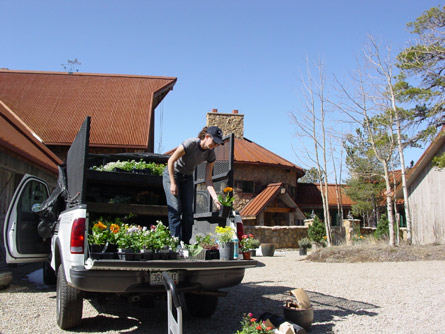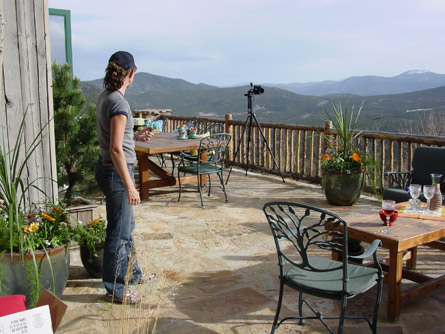The Glass Ceiling is Broken
Prior to the “sexual revolution” of the ’60s and ’70s, career choices for women were very limited and advancement nearly impossible. Women could be teachers, but not principals; stewardesses, but not pilots; nurses, but not doctors.
Gardening was a hobby for wives to have something to do while their husbands were at work and the children were at school. Careers in landscaping were traditionally for men only; females need not apply. But a few courageous women chose to ignore tradition. They forged ahead in spite of the many obstacles they faced, and formed their own landscape businesses. It wasn’t easy.
Joanne Kostecky, owner of Garden Design, Allentown, Pennsylvania, started her business in 1979, when women in the landscape industry were looked on as a financial risk. Time after time, her loan applications for a truck and equipment were turned down because she was a single woman in a predominantly male industry. Not one to let a small thing like not having a vehicle get in her way, she made an arrangement with her foreman to rent his truck while she grew her business.
Once she had her wheels, Kostecky’s challenges were far from over. She still had to overcome the attitude of the men who ran the nurseries where she purchased her plants.
“When I first started, I’d get in my truck and pick up the plant material myself. A lot of nurserymen treated me like the “little woman,” the wife of somebody who was just coming to pick up plants for my garden. I really hated it.”
Confronted with this challenge, Kostecky made it her personal mission to change their perception. Over the next two years, she worked harder and longer than she ever had in her life to prove herself. “I had to show them that I knew and cared about what I was doing. Once they saw me as a true professional, their attitude changed.

They finally saw that I was a hardworking professional landscape designer and business owner, but it took a very long time.”
Kostecky’s accomplishments didn’t stop with being accepted by her local community. In 2007, she became the first female president of the American Nursery and Landscape Association. She is the first woman to receive the Hall of Fame Award from the National Landscape Association and the first female recipient of the Pennsylvania Landscape and Nursery Association’s Hall of Fame Award.
You could say that those early goals she set for herself were more than met, and she succeeded beyond her wildest dreams. Over the last 30 years, Garden Design has won a record 23 Merit and five Honor Awards from the national Perennial Plant Association; more than 35 Gold, 24 Silver, 11 Bronze, and seven Honorable Mention Awards for design excellence from the Pennsylvania Landscape and Nursery Association; three Gold, six Silver, and three Bronze design awards from the Association of Professional Landscape Designers; and numerous Lehigh Valley Builder’s Association’s recognition of Excellence in Landscape Design.
In another part of the country, Liza Lightfoot, owner of Avant Gardening and Landscaping, McFarland, Wisconsin, founded her company in 1985. “I started the business with $200 and gradually built it up from there.” Today, Avant Gardening employs many people who perform landscape installation, maintenance and snow removal services, supervised by a management staff of five. But Lightfoot has taken some serious hits from her male peers along the way.
“Some men in the industry have brought on challenges by spreading rumors about me and my business that have been untrue and potentially damaging,” Lightfoot said.
“One in particular happened in 2009, when an independent landscape architect spread the rumor that my business was facing bankruptcy, which it was not. Another male competitor was telling potential clients that I was claiming to be a landscape architect, but didn’t have a license. I went to his office and made sure he became aware of my license to practice landscape architecture. I won’t tell you how I accomplished that, but let’s just say he won’t question me again.”
Lightfoot handles adversity directly, but always maintains her professionalism, especially when she deals with clients. “I have received phone calls from prospective clients who, when they hear my voice, ask to speak to my husband, or the man who owns the business. Some of them have questioned if we are capable of doing the work. When I tell them that we have been in business for 25 years and are fully equipped to handle landscape construction jobs, they seem to relax a bit and we usually get the job.”
And so it goes with many of the women who chose to break the barrier of a male-dominated profession.
Even before she opened her company in Mission Viejo, California, Angelia Beckstrom, owner of Angeffects, Inc., was confronted by prejudices for her talents in landscape design.
“Growing up, my dad was a civil engineer and my mom grew everything we could eat in our backyard. One of the assignments in my horticulture class was to do a landscape design. When I turned in the assignment, the teacher accused me of paying someone else to do it, because it was too professional. I tried to explain that, having grown up around plants from my mother and having knowledge of blueprints from my father, I found the design project to be a lot of fun, and told him so. He still didn’t believe me, so I left school and opened my landscape design business.”
Early in her career, Beckstrom was warned about the difficulties she might face in a male-dominated industry. “I met with another female designer who had been in business for about 30 years, and she was getting a bit bitter. She said that many other women had gotten squeezed out of their jobs because men just wouldn’t give her work, or want to work with her because she’s a ‘girl’.”
Beckstrom came up with her own unique solution by deciding to work with, and not try to compete with, her male associates for jobs. “In order for me to succeed, I realized that I needed to let the man be the man. I let him be the lead, let him be the person in charge, and gave him support to help him succeed. That way, we all win.”
By taking that attitude, Beckstrom has been able to open doors to landscape design jobs which might have been shut tight before. Her approach is to work with all the parties on a project. “Every male contractor wants to do a good project and every property owner wants to have a pretty property. As in every relationship out there, it’s a question of communication. I think that women have the ability to sit and listen and understand and help everybody get on the same page.”
Communication skills with other professionals are one thing, but sensitivity to the client is another. When Beckstrom goes to a client’s home for a consultation and she’s meeting with a married couple, she has to be very careful to dress in an ultra-conservative manner.
“When I go into the home and talk to homeowners, I will definitely dress down as much as possible, because I don’t want to incite any type of jealousy. I dress like a landscape professional—nondescript clothing, no flash or heavy jewelry. Men don’t have to deal with this at all.”
“If the prospective client is just doing a front-ofthe-house retrofit, or if the woman is making the decision as to who to hire, then we have an equal shot, because the homeowner doesn’t care who plants the flowers. But when it comes to a construction project that has to do with moving boulders, or changing the grade with heavy construction, that’s a factor. Even though my crew has some pretty big, strong guys, the client doesn’t think about that; they only see that this is a female-owned company and they need a man to do a construction project,” Lightfoot says.

Women who have a passion for landscaping find they’re never happy doing anything else, no matter how much money they’re making. Sandy Haynes got her real estate license and was making a very lucrative living selling houses, but she felt drawn to her love of gardening. She took a leap of faith, quit her job and followed her dream.
For the next few years, she fine-tuned her skills and learned the landscape business inside and out. She noticed a need in the industry for a landscape company that listened to their clients’ needs, and then designed the gardens according to their wishes. She soon became confident enough to start her own company and, in 2002, co-founded Stonegate Gardens in Denver, Colorado.
Leslie Ebert began a career in graphic design, but soon grew tired of sitting behind a desk. She decided to take an entry-level summer job working for a Denver landscaping company and soon fell in love with working outdoors, as well as enjoying the creative and physical aspect of the job. She never had any trepidation over her decision, and would like to see other female landscape contractors emerge onto the scene.
“I think the reason why there aren’t more women in the business is because there’s still a perception that little girls aren’t supposed to get their hands dirty,” Haynes said, “But with young girls playing soccer and what used to be considered boy’s sports, that idea is changing fast. I have no doubt that there will be many more women in this business in the next few years.”
While working in a traditionally male profession comes with its challenges, women in the landscape industry believe there are plenty of rewards. As these women share their experiences with younger generations, the number of females pursuing these careers is on the rise.
According to the American Association of University Women, 60% of today’s university landscape architecture graduates are women.
“There are enough women now in the industry that I think it’s a whole lot better than when I first started 30 years ago,” Kostecky says. “We do need to reach out to more women who may not be aware of the opportunities that exist in landscaping.”
Lightfoot agrees. “I will never forget the first meeting I attended of the Wisconsin Landscape Contractors Association (WLCA) in 1988. When I walked into the room, you could have cut the silence with a knife. The look on the men’s faces was priceless. Gradually, after a number of years, one or two women would show up. Then I convinced another female landscape contractor to join the WLCA and she brought her female staff members to meetings. Now, we have many women as members and our chapter is better for it, I believe.”
Networking opportunities in the landscaping profession are also becoming more women-friendly. Organizations such as the California Landscape Contractors Association (CLCA) and the Professional Landscape Network (PLANET) are seeing an increase in Eileen Ferguson female members.
“I joined CLCA, and found a worthy brotherhood of professionals who are willing to take work from me and collaborate with me and my clients, and they will use me to collaborate with theirs,” Beckstrom says. “I’ve been encouraging other women to come to the meetings and get involved with the group. I’m finding that there are even more women in this industry than I thought. It’s great to see how their businesses operate in comparison to men.”
Eileen Ferguson, owner of Designs for Living, Roswell, Georgia, hasn’t seen many female landscape contractors in her part of the country and wishes there were more. “Women in our industry still have to work harder and longer to establish themselves. I hope that, as more women come into the landscape professions, it will become easier to be accepted by their male counterparts, much like female principals, doctors and pilots are today.”
To see the full article, visit https://igin.com/article-1400-The-Glass-Ceiling-is-Broken.html
